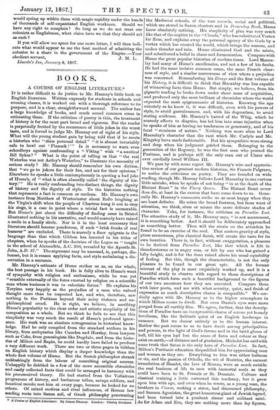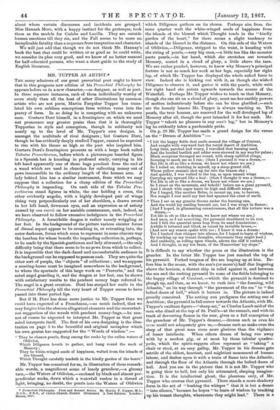BOOKS.
A COURSE OF ENGLISH LITERATURE.*
IT is rather difficult to do justice to Mr. Hannay's little book on English literature. Written expressly for students in schools and -evening classes, it is worked out with a thorough reference to its purpose, and is a clear, straightforward manual. The author has
a large knowledge of books, and much sound common sense in estimating them. If the criticism of poetry is thin, the treatment of history is for the most part broad and vigorous. But the reader is perpetually fretted by the recurrence of little jokes in the worst taste, and is forced to judge Mr. Hannay out of sight of his style. What will the young student gain by being told that if he meets a historian who "shies personal detail" "it is almost invariably safe to bawl out Pinnock ! ' " Is it necessary to warn even :schoolboys against confounding a " Viking " with "a nautical Bill Sykes?" What is the point of telling us that "the real Waterloo was not Astley's Waterloo," to illustrate the necessity of serious study ? Mr. Hannay should remember his own dictum, that "we go to jokers for their fun, and not for their opinions." Elsewhere he speaks a little contemptuously in quoting a bad joke of Hume's, of "what is often absurdly called the dignity of his- tory." He is really confounding two distinct things, the dignity of history and the dignity of style. To the historian nothing that represents a fact is common or unclean. Mr. Hannay's own instance from Matthew of Westminster about Rollo laughing at the Virgin's shift when the people of Chartres hung it out to stop his siege, is a case in point where a trivial fact is memorable. But Hume's jest about the difficulty of finding asses in Bristol illustrated nothing in his narrative, and would scarcely have raised a smile in a family circle. Nor is it in the least necessary that literature should become ponderous, if such "brisk freaks of real humour" are excluded. There is scarcely a finer epigram in the language than that which Gibbon has inserted in his titles of chapters, when he speaks of the doctrine of the Logos as "taught in the school of Alexandria, A.C. 300, revealed by the Apostle St. John, A.D. 97." The argument may be unsound, is, perhaps, dis- honest, but it is reason applying facts, and style embalming a dis- sertation in a sentence.
Mr. Hannay's estimate of Hume strikes us as, on the whole, the best passage in his book. He is fully alive to Hume's want of sympathy with religion and enthusiasm, while he was yet "sensible externally of the force exerted by religion on a scientific man whose business it was to calculate forces." He explains his Toryism very happily as the prejudice of a man who valued thought more than he respected law, and who, therefore, saw nothing in the Puritans beyond their noisy violence and un- philosophical creed. He is right, we believe, in ascribing Hume's popularity to the clear order and artistic simplicity of his composition as a whole. But we think he fails to see that this simplicity was very much the result of Hume's profound ignor- ance. His work was an absolute retrogression in historical know- ledge. Had he only compiled from the standard authors in his library, from antiquaries like Camden and Horsley, from lawyers such as Coke, from genealogists like Dugdale, and from the histo- ries of Milton and Rapin, he could hardly have failed to produce a very different work. There are two or three pages in Gibbon on English history which display a deeper knowledge than the whole first volume of Hume. But the Scotch philosopher shrank unblushingly from the labour of consulting original sources. Unhappily he dabbled in a few of the more accessible chronicles and easily collected facts that could be arranged in harmony with his preconceived theory. He had started from the Voltairean programme of history, and barbarous tribes, savage soldiers, and fanatical monks met him at every page, because he looked for no others. Of mixed motives and rival influences, of Roman law sending roots into Saxon soil, of Greek philosophy penetrating Course of English Literature. By James Hannay. London : Tinsley Brothers. the Medifeval schools, of the vast records, social and political, which are stored in Saxon charters and in Domesday Book, Hume
knew absolutely nothing. His simplicity of plan was very much like that of the sophist in the "Clouds," who has substituted Vortex for Zeus, and explains away the personal agency of the Gods by a vortex which has created the world, which brings the seasons, and makes thunder and rain. Hume eliminated God and the saints, and substituted a belief in chaos and fermentation. Compare with
Hume the great popular historian of modern times. Lord Macau-
lay had many of Hume's excellencies, and not a few of his faults. He had the same incisive common sense, the same French clear- ness of style, and a similar narrowness of view where a prejudice
was concerned. Remembering his Essays and the first volume of his History, it is difficult to think that Macaulay was less capable
of winnowing facts than Hume. But simply, we believe, from his gigantic reading he broke down under sheer mass of acquisition, and produced only the most brilliant of chronicles where the world expected the most epigrammatic of histories. Knowing the age
minutely as he knew it, it was difficult, even with his powers of style, to avoid garrulousness, and, with his dogmatism, to avoid
stating evidence. Mr. Hannay's hatred of the Whig, which he scarcely affects to disguise, has led him into some injustice when he speaks of him as having no tenderness or generosity, and of his fatal "stoniness of nature." Nothing was more alien to Lord Macaulay's character than the rant which Mr. Carlyle and Mr. Kingsley have made fashionable. But his sympathies were strong and deep when his judgment guided them. Belonging to the generation of the Regency, he was the first man who praised the Puritans, and is perhaps still the only man out of Ulster who ever cordially loved William III.
We pass by with some regret Mr. Hannay's wise and apprecia- tive review of our greatest modern historian, Sir Francis Palgrave, to notice the criticisms on poetry. They are founded on wide reading, though Mr. Hannay follows Lord Macaulay in one curious little mistake, when he speaks of not being "in at the death of the Blatant Beast " in the Faery Queen. The Blatant Beast never does die, at least in the cantos that have come down to us. Gene- rally Mr. Hannay's comments strike us as most happy when they are least definite. He seizes the broad features, but from want of attention, we think, slurs or misses the more delicate shades of character. Take, for instance, the criticism on Paradise Lost. The attentive study of it, Mr. Hannay says, "is not amusement, it is something better. And it should be deliberately approached as something better. Then will the strain on the attention be found to be an exercise of the soul. That austere gravity of style, pious earnestness, plus classical finish, will create the taste for its own beauties. There is, in fact, without exaggeration, a pleasure to be derived from Paradise Lost, like that which is felt in thunderstorms or in angry seas, or felt by one who has gained a lofty height, and is for the time raised above his usual equability of feeling. But this, though the characteristic, is not the only pleasure to be found in our great epic. All the human interest of the play is most exquisitely worked up, and it is a beautiful study to observe with regard to those descriptions of Paradise which form such a beautiful background to the figures of our two ancestors how they are executed. Compare them with later poets, and see with what severity, quiet, and finish of expression so much descriptive charm is compatible." We cor- dially agree with Mr. Hannay as to the higher atmosphere in which Milton seems to dwell. Not even Dante's eyes were more purged from all earthly film. We agree, further, that the descrip- tions of Paradise have an inexpressible charm of serene yet homely loveliness, like the Sabbath quiet of an English landscape in summer. But we demur entirely as to the human interest. Rather the poet seems to us to have dwelt among principalities and powers, in the light of God's throne and in the lurid gloom of hell, till his eyes had lost the sense of form and colour as they exist on earth,—of distance and of gradation. Michelet has said with some truth that Satan is the only hero of Paradise Lost. In fact, Milton's Puritanic education disqualified him for appreciating men and women as they axe. Everything to him was either holiness or sin, and the passion of Othello, the wit of Beatrice, the earnest irresolution of Hamlet, the love of Romeo, were as much outside the real business of life to men with immortal souls as they could have been to St. Francis or St. Dominic. Culture and classical training a little corrected this tendency, but it grew upon him with age, and even when he wrote, as a young man, the brothers in Comas, seeking a sister, had discoursed philosophy, and Samson Agonistes, the great humorous giant of Jewish legend, had been turned into a penitent sinner and militant saint. As for Adam and Eve, they are nothing more than lay figures,
about whom certain discourses and incidents are grouped. Miss Hannah More, with a happy instinct for the grotesque, took them as the models for Ccelebs and Lucille. They are outside human emotions till they sin, and the Fall seems to be more an inexplicable fatality than a sequence from temptation and character.
We will just add that though we do not think Mr. Hannay's book the best that could be written or as good as he could write, we consider its plan very good, and we know of no better manual for half-educated persons, who want a short guide to the study of English literature.































 Previous page
Previous page